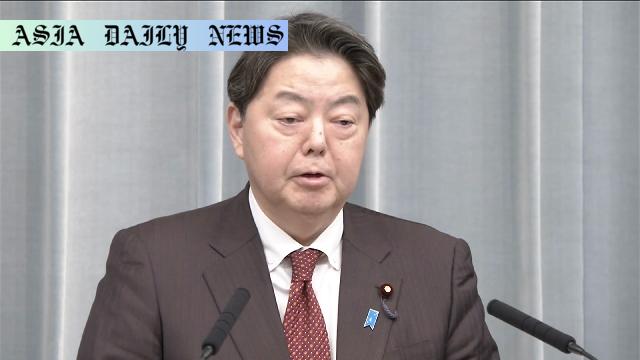Ceasefire: Japan welcomes the ceasefire agreement between Israel and Iran and stresses the importance of peace and stability.
Key Point 1: Japan welcomes the Israel-Iran ceasefire agreement announced by US President Trump.
Key Point 2: Chief Cabinet Secretary Hayashi emphasized the importance of swift stabilization and dialogue between the parties.
Key Point 3: Japan highlights Middle Eastern peace as vital to its own national stability and safety of its citizens.
Key Point 4: Japan pledges ongoing diplomatic efforts with international partners in response to the development.

Introduction to the Israel-Iran Ceasefire
The announcement of a ceasefire agreement between Israel and Iran has stirred hope for diplomatic resolution in the Middle East. This development, disclosed by US President Donald Trump, followed an escalation in military conflicts that included Iran’s retaliatory attack on a US base in Qatar in response to US strikes on Iranian nuclear sites. Chief Cabinet Secretary Hayashi Yoshimasa has openly expressed Japan’s approval of the agreement, emphasizing the urgent need for stability in the region.
Japan’s Stance on Middle Eastern Stability
Japan has always had a vested interest in the Middle East due to its dependency on the region for energy resources. Hayashi reiterated Japan’s position that peace and stability in the region are crucial not only for global prosperity but also for Japanese domestic interests. The government is now focused on fostering dialogue among the involved parties to ensure the ceasefire agreement is honored and a lasting solution is found. Japan’s diplomatic efforts will also be directed toward the safety of its nationals living and working in the turbulent region.
The Broader Implications of the Ceasefire
The ceasefire is an opportunity to reset the discourse around Israel-Iran relations, which in recent years have been marked by hostility and conflict. While skepticism remains about the implementation and longevity of the agreement, international collaboration may play a pivotal role in supporting this truce. Japan’s proactive approach to promoting communication highlights the importance of multi-faceted diplomacy in ensuring peace.
The Role of International Diplomacy
International stakeholders, including Japan, the United States, and other global players, are expected to work together to strengthen trust and accountability between Israel and Iran. Additionally, the involvement of the United Nations and various peacekeeping organizations may help in monitoring the ongoing situation. For Japan, this marks an opportunity to show its commitment to global peace, leveraging its neutral stance to mediate and foster reconciliation.
Conclusion
While the ceasefire agreement is undoubtedly a monumental step toward peace, its success will depend on the cooperation of all relevant parties and the active participation of international players like Japan. By emphasizing dialogue and stability, Japan demonstrates its commitment to a peaceful resolution. The international community now faces the critical task of ensuring that this agreement translates into lasting peace for a region plagued by decades of conflict.
Commentary
Importance of a Ceasefire in a Volatile Region
The news of a ceasefire between Israel and Iran provides hope in what has been a persistent cycle of violence and instability in the Middle East. Such an agreement is not only significant for the nations directly involved but also for the global community at large. Japan’s response to this event reflects its understanding of the broader stakes tied to Middle Eastern peace, including economic interests and global security. It is commendable that Japan is prioritizing diplomacy and aligning itself with international efforts to foster a lasting resolution.
Japan’s Strategic Perspective
Japan’s concern for peace in the Middle East is deeply rooted in its reliance on the region for energy resources. However, its approach goes beyond self-interest. By advocating for stability and dialogue, Japan is showcasing its value as a mediator in global geopolitics. The nation’s emphasis on ensuring the safety of its citizens further highlights a responsible and measured foreign policy approach. This proactive stance signifies Japan’s role as a promoter of peace, willing to contribute constructively to global discussions on security and stability.
Challenges and the Path Forward
Despite the optimism surrounding the ceasefire, challenges remain. There is a need for stringent monitoring and accountability to ensure adherence to the agreement. Skepticism from both domestic factions within Israel and Iran, as well as external stakeholders, could undermine this fragile progress. Therefore, it is crucial for nations like Japan to remain engaged in the process, using their diplomatic channels to mediate conversations and prevent further escalations. This agreement could potentially serve as a framework for addressing other conflicts in the region in the future.
Conclusion
The Israel-Iran ceasefire signifies a moment of hope amidst prolonged tensions. Japan’s swift acknowledgment and encouragement of this agreement highlight its commitment to global peace and stability. While the path ahead is fraught with challenges, sustained international cooperation led by nations such as Japan can maintain momentum toward realizing a more peaceful Middle East. This development underscores the value of diplomacy in resolving conflicts and sets a precedent for collaborative efforts in international relations.


